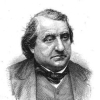Ernest Renan

Ernest Renan
Joseph Ernest Renanwas a French expert of Middle East ancient languages and civilizations, philosopher, historian, and writer, devoted to his native province of Brittany. He is best known for his influential historical works on early Christianity, and his political theories, especially concerning nationalism and national identity. Renan is credited as being among the first scholars to advance the Khazar theory, which held that Ashkenazi Jews were descendants of Turkic peoples who had adopted Jewish religion and migrated to Western Europe...
NationalityFrench
ProfessionHistorian
Date of Birth28 February 1823
CountryFrance
No idea can succeed except at the expense of sacrifice; no one ever escapes without enduring strain from the struggle of life.
Morality has been conceived up to the present in a very narrow spirit, as obedience to a law, as inner struggle between opposite laws. As for me, I declare that when I do good I obey no one, I fight no battle and win no victory. The cultivated person has only to follow the delicious incline of his or her inner impulses. Be beautiful and then do at each moment whatever your heart may inspire you to do. This is the whole of morality.
O Lord - if there is a Lord; save my soul - if I have a soul
God, if there is a God, take my soul, if I have a soul.
The only way of salvation for the world is by returning to thy allegiance.... Firm in my faith, I shall have force to withstand my evil counsellors, my skepticism, which leads me to doubt of the people, my restless spirit which, after truth has been brought to light, impels to go on searching for it...
Jesus was the greatest religious genius that ever lived.
As soon as sacrifice becomes a duty and necessity to mankind. I see no limit to the horizon which opens before him.
The liberty of the individual is a necessary postulate of human progress.
History is as much an art as a science.
Blessed are the blind, for they know not enough to ask why.
His glory Jesus Christ does not consist in beingplaced without the confines of history; a more real worship is paid to him, by showing that the whole of history is incomprehensible without him.
The greatest men of a nation are those it puts to death.
When people complain of life, it is almost always because they have asked impossible things of it.
As a rule, all heroism is due to a lack of reflection, and thus it is necessary to maintain a mass of imbeciles. If they once understand themselves the ruling men will be lost.